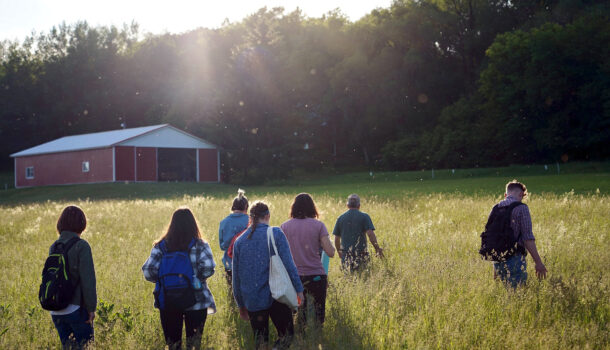ABOVE PHOTO: Students from UW-Stout’s LAKES summer research program visit a Dunn County Farm. The university has received a grant to develop a wireless sensor network for farm fields to improve efficiency on small farms.
In a perfect world, farmers could wave a magic wand over their fields and get bigger and better crops, save money and energy, and help the environment.
Professors at University of Wisconsin-Stout are developing a low-cost, wireless sensor network to monitor farm fields that isn’t a magic wand — but comes close. Using research, engineering and the power of modern technology, including the Internet of Things, it has the potential to make small farms more profitable.
The social science/engineering project has received a two-year, $175,000 Innovation Grant from the Universities of Wisconsin. President Jay O. Rothman announced the grant Thursday, Jan. 18.
“We are very excited to see this proposal’s future development and how its innovations will positively affect the Universities of Wisconsin, Wisconsin citizens and communities, and the state’s economic growth,” Rothman said.


UW-Stout’s project, A HumanCentered Collaborative Approach to Designing an Energy-Efficient Wireless Sensor, will be a network of eight sensors that monitor temperature, humidity, wind, soil moisture, heat and more. The sensors feed data to a central unit in the ground, a sink node, which relays it to a satellite tower and the Internet.
Farmers would then evaluate the information to support decision-making regarding their crops.
Research has indicated that precision agriculture can significantly enhance farming efficiency, increasing crop yield and quality by at least 15%, reduce the cost of water and pumping it by 30% and boost profitability by up to $100 per acre.
Farmers have been slow to adopt similar technology because of cost and maintenance issues. But this network will be battery-operated — no wires to bury. Plus, the sensors will harvest various types of ambient energy, such as geothermal, to reduce the need for battery replacement.



